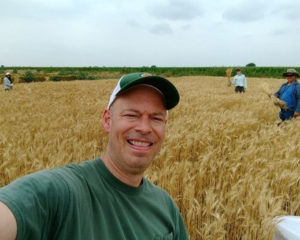292: Jake Mowrer on Crop Roots.
Appreciating the relationship between plant roots and the life in the soil.
 Jake was raised on a farm in north Georgia where his family produced broiler chickens and beef cattle. Growing up, the work was often hard, but the food was always good. Life on the farm is a good way to gain an appreciation for the connectivity of food production in our daily lives.
Jake now works with farmers in Texas as a Texas A&M faculty member in the Soil and Crop Science Department, and as an Extension Specialist with Texas A&M AgriLife Extension to communicate the importance of managing soil as a natural resource.
Jake was raised on a farm in north Georgia where his family produced broiler chickens and beef cattle. Growing up, the work was often hard, but the food was always good. Life on the farm is a good way to gain an appreciation for the connectivity of food production in our daily lives.
Jake now works with farmers in Texas as a Texas A&M faculty member in the Soil and Crop Science Department, and as an Extension Specialist with Texas A&M AgriLife Extension to communicate the importance of managing soil as a natural resource.
His research has become focused on the way that crop roots behave in their soil environment to better understand the best practices for keeping soils continuously functional & productive, both for people and the ecosystems we inhabit.Don’t miss an episode! Click here to sign up for weekly podcast updates
In This Podcast:
We meet Jake Mowrer and understand what brought him to his studies on soil and the relationships between crop roots and the complex community of life in the world beneath us. This often-invisible world is so essential to the foods that we eat, and the interaction between the subterranean portion of crops and the microbial lifeforms there are easily overlooked. We learn more about what is happening between these elements and why this is crucial to our semi-finite resource of soil.
Listen in and learn about:
- Growing up on a farm in a family of six boys
- Appreciating the energy that goes into the food cycle and produce enough food for a family of eight
- Turning 18 and walking away from farming
- His time as a chef and learning about how to elevate foods,
- His interest in how to elevate common foods without spending a lot of money
- Why he wants to elevate foods and why that makes a difference, and how he does that
- Getting hurt while working as a carpenter, then going to work using his science degree
- Working at Texas A&M in the soil testing department, then pursuing his masters and PhD
- Moving into teaching and loving it
- Soil as a scientist and why he does not need it to be clarified as “dirt”
- The makeup of soil, and how it is the largest reservoir of microbial biodiversity on the planet
- Soil is not renewable except on a geologic timescale
- Why and how to protect soil
- The time it takes to lose soil versus the time it takes to re-make it
- Cover crops as any crop that is used to help keep roots in the soil and protect it from wind loss
- Some of the various qualities and benefits of different cover crops
- Tap roots versus grass roots
- The processes of different roots up-taking nutrients and the living cycle in the soil
- What happens to nutrients when roots die
- Soil humus as an important resource
- The layers of soil life that create a buffer for the complex microbiological community
- Communication or feedback between roots and soil
- The relationship between arbuscular mycorrhizal fungus and plant roots and
- How it is mutually beneficial
As well as:
- His failure – Being a perfectionist and expecting a lot from others and himself, to the point of not having fun
- His success – His children – musicians, artists, mathematicians, budding scientists who are very thoughtful people
- His drive – Wanting to make a difference and conducting himself in a way that will have a positive impact
- His advice – Pay attention when you eat food, when you grow food; and Call it what you want – just play with the dirt
Jake’s Book recommendations:
Enriching the Earth: Fritz Haber, Carl Bosch, and the Transformation of World Food Production (MIT Press) – Vaclav Smil
How to reach Jake:
Faculty page at Texas A&M: Jake Mowrer
Twitter: @root_notes
Blog: rootnotes.tamu.edu
UrbanFarm.org/RootNotes



